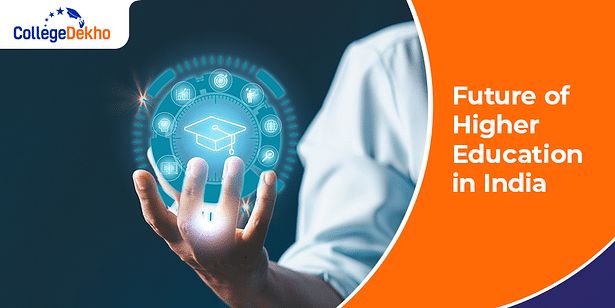
The future of higher education in India is poised for significant transformation, driven by technological advancements, policy reforms, and evolving societal needs. While some traditional courses continue to be popular among students, there has been a spike in new-age programmes that open doors to many ventures. We can expect a similar trend going forward as well.
Based on the HEART report by CollegeDekho , higher education in India is one of the largest sectors that will contribute massively to the country’s economy. Hence, the growth and evolution of this area is inevitable. With students having easier access to information and a wide range of career possibilities, creating a more dynamic, inclusive, and globally competitive education system has become even more necessary.
Also Read:
CollegeDekho Launches India’s First Higher Education Trends Report - 'HEART'
Technological Integration
Integrating technology into higher education is a revolutionary learning experience and its need is expected to increase manifold across all streams. Since the COVID-19 pandemic, online education has witnessed a steep acceleration among both students and working professionals. We can expect such trends to continue because it allows students to pursue online learning at their convenience with relatively lower fees.
While classrooms in the future can be hybrid - blending online and offline modes to provide flexible and accessible education, including technical advancements such as Virtual Reality (VR), Augmented Reality (AR), and Artificial Intelligence (AI) will play a crucial role in enhancing interactive learning. Colleges are also expected to invest in their digital infrastructure, including high-speed internet, digital libraries, and virtual labs.
Continued Popularity of Some Courses
Streams such as Humanities/ Arts and courses like B.Tech and MBA have continuously featured in the top choices of students seeking admission. Other courses have also emerged in the last few decades but a huge number of students continue to opt for career-oriented degrees in engineering and management. It can be expected that many students will be interested in these courses in the future as well since the job market demands B.Tech/ MBA graduates across sectors.
Also Read:
| Role of CollegeDekho in Higher Education | Challenges and Trends in Higher Education |
|---|---|
| Recent Trends in Higher Education in India | Changing Market Trends in Higher Education in India |
New Colleges in High-Populated States
Students have had to move to different states to pursue higher education because of the disparity between the total colleges in a state and its student population. However, in the past few years, it has been observed that the migration of students from their domicile state has reduced with the introduction of new colleges and universities. The youth prefers to move to a different city of their state rather than relocating to a new state altogether. Opening colleges in states with higher student populations will allow them to continue studying without the need for migration.
Emphasis on Skill-Based Education
The demand for a workforce equipped with specialised skills rather than mere academic knowledge is reshaping the curriculum in higher education. Future education systems will focus on skill-based learning, promoting practical and industry-relevant skills. It is expected that specialisations such as AI, Data Science, Machine Learning, Digital Marketing, Cybersecurity, etc will become more prevalent among students. Furthermore, as per NEP 2020, interdisciplinary education is likely to gain traction, bridging the gap between different fields of study.
Related Links:
Policy Reforms in Government and Private Institutions
The NEP 2020 is a landmark policy that aims to revamp the Indian education system with a focus on holistic and multidisciplinary education, flexibility in curriculum design, and fostering critical thinking. It is expected that the implementation of NEP 2020 will increase the Gross Enrollment Ratio (GER) in higher education, aiming for 50% by 2035. Private and government colleges will have to reform their pedagogy, infrastructure, and other aspects of education to be aligned with the NEP.
















Similar Articles
ITI Courses After 10th in India: Admission Process, Types, Fees, Career Options
List of Animation Courses After 12th: Popular Courses, Eligibility, Scope, Jobs & Salary
Top Delhi University Colleges 2025: NIRF Ranking & Score
List of Entrance Exams for Home Schooled Students
List of Schools for Homeschooled Students for Board Exams
List of Colleges and Courses for Homeschooled Students